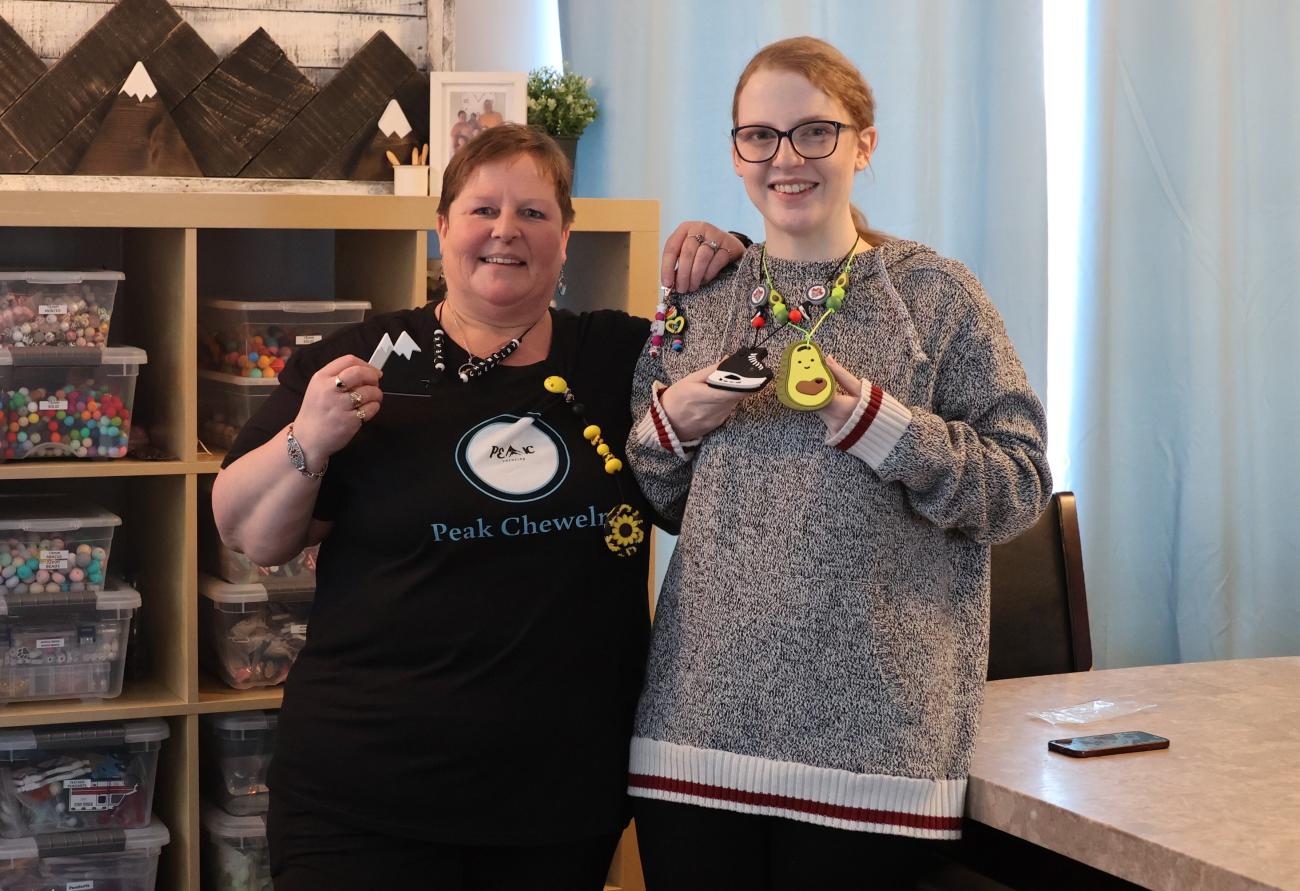“What do you do for a living?” Whether you’re meeting someone for the first time or making small talk with your barber, this is a question we spend most of our lives answering. For most of us, the answer is straightforward. For others, their job is more than a title; it’s a story. Over the next few weeks, The Citizen will introduce you to locals whose careers break the mould—jobs that are rare and remarkable. Let’s meet them together.
Bonny and Mariah Fehr of Niverville are proprietors of a unique home-based business, Peak Chewelry. Their product? This mom-daughter duo creates accessories for toddlers and children using food-grade silicone beads that are perfect for teething, sensory touch, and stimulation.
It was Bonny’s granddaughter Peyton who inspired the business.
“Peyton has Rett Syndrome,” Bonny says. “She has impulse control issues and needs sensory [stimulation]. She likes to grab people’s hair, pinch, and bite.”
The child also spent much of her time with her hand in her mouth, causing her skin to get raw and sore.
Bonny says they found some teething rings online that were attached to string necklaces. These held some mild appeal to her granddaughter, but they provided little sensory stimulation when it came to offering a variety of textures, shapes, and colours.
Frustrated with the lack of products available for highly sensitive children, Bonny and Mariah decided to create their own.
First they found a supplier for child-safe beads and accessories out of Ontario. Then they set out to create different necklace designs that would appeal to Peyton, each with a chewable pendant and a string of colourful beads up the sides.
“Every Christmas we would make about a dozen different ones for her,” Bonny says. “We’d make them colour-[coordinated] to match all her outfits and to look like jewellery.”
That was four years ago.
This year, Peyton will be 13 years old and she still loves her hand-crafted tactile accessories. Her special needs EAs enjoy seeing the latest creations their young charge shows up with at school each day.
It wasn’t until early 2024 that Bonny discovered a course in entrepreneurship through Manitoba Possible, formerly the Society for Manitobans with Disabilities. Over several months, she worked at online modules that trained her in every aspect of opening and managing a small business. She was also provided a business mentor to help ensure her success.
In November 2024, the women legally registered the name of their new business. The peak in Peak Chewelry is an acronym representing the first names of Bonny’s five grandchildren.
As well as helping to design the chewelry, Mariah is the company’s website designer and social media manager.
Peak Chewelry launched in the fall of last year. Since that time, the pair has expanded their unique creations to include an assortment of fun pens, keychains, and zipper pulls. They also custom-make items for personalized gifts.
In the end, Peyton isn’t the only beneficiary of this novel business. For Bonny, this endeavour opens the door to a more hopeful outlook after years of struggling through the highs and lows following a medication-induced injury.
In 2016, not long after becoming an early childcare educator, Bonny developed bronchitis-like symptoms. Because she worked with infants in a daycare setting, she went to the emergency room.
She was prescribed a common antibiotic, Ciprofloxacin, and told to complete the round of 16 pills.
After just the fourth pill, she noticed something was very wrong.
“On Monday, I was at daycare and I was changing a child on the change table,” Bonny says. “All of a sudden, we heard this audible pop and my wrist instantly swelled. I couldn’t move it and I was [in terrible pain].”
Returning to emergency, Bonny was diagnosed with a ruptured tendon and told that her weight was the likely cause. She was instructed to continue with her antibiotics, which she did.
The situation only got worse. Her skin felt like it was on fire and she was in constant pain. Her mobility regressed rapidly until, within a short period, she could barely walk at all.
Feeling desperate, she contacted her pharmacist. When she described her symptoms, he told her to stop the prescription. But it was already too late for that.
Since that time, she’s discovered this antibiotic has known side effects that were never disclosed to her. They include everything Bonny has experienced and more.
“This is one of the number one prescribed medications,” Bonny says. “I found a support group and there’s thousands and thousands of us.”
Bonny has been living with pain and lack of mobility for eight years and is still at risk of rupturing tendons. Initially able to collect disability through her work benefits plan, she’s since been cut off because drug injury isn’t a condition they recognize.
While advocating for other people like her, Bonny wakes up every morning mustering the courage to face challenges, find purpose in her new mission, and bring people joy.
“My mom always reminds me that I got to be there for the birth of our last three grandkids and take care of them,” she says. “I get to be there for my daughter, who’s a single mom and needs help with her kids because there’s no room in the daycare. It’s those little blessings [that show] what’s important.”
Bonny may not be capable of working at her dream job in childcare, but she says the new business gives her another way to make a difference in people’s lives—and she’s good with that.


